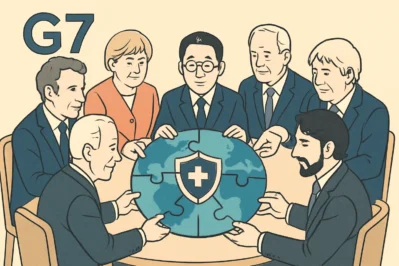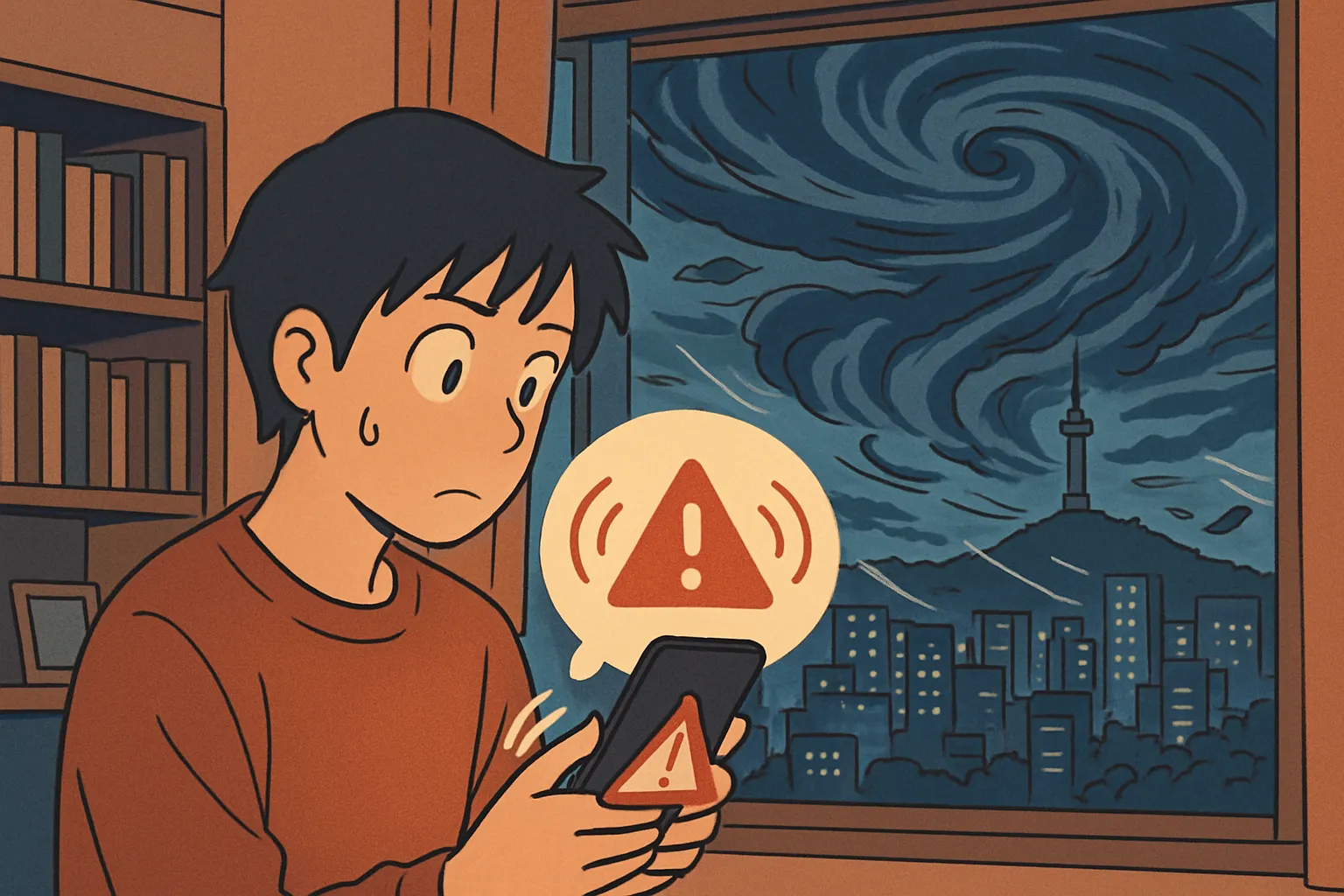Level Up Your Korean: Negotiating at the G7 Summit!
Hello! Welcome to [Maeil Hangul], where we upgrade your Korean skills to the next level!
Today, we’re stepping onto the world stage. Imagine you’re a delegate at a G7 summit, tasked with discussing global pandemic preparedness. This isn’t just a fantasy scenario! Lately in Korea, there’s been a surge of interest in the nation’s growing role in international affairs, especially after its globally recognized response during the early stages of the COVID-19 pandemic, often dubbed “K-방역” (K-Quarantine). Today, you’ll learn the sophisticated, formal language needed to articulate complex ideas and persuade others in high-stakes professional settings, just like a real diplomat. Let’s get ready to lead the discussion!
Key Diplomatic Expressions
Here are some essential phrases you’ll need to navigate a high-level discussion on global health.
1. 선제적으로 대응하다 (seon-je-jeok-eu-ro dae-eung-ha-da)
- Pronunciation [Romanized]: seon-je-jeo-geu-ro dae-eung-ha-da
- English Meaning: To respond preemptively; to take proactive measures.
- Detailed Explanation: This is a powerful and formal phrase used in strategic contexts like policy, business, or defense. It goes beyond simply ‘reacting’ (대응하다). The adverb 선제적으로 emphasizes taking action before a problem becomes critical, showing foresight and initiative. It’s a key term when proposing a forward-thinking plan.
2. 공조 체계를 구축하다 (gong-jo che-gye-reul gu-chuk-ha-da)
- Pronunciation [Romanized]: gong-jo che-gye-reul gu-chuk-ha-da
- English Meaning: To establish a cooperative system/framework.
- Detailed Explanation: This is core diplomatic language. 공조 (gongjo) means ‘cooperation’ or ‘joint effort,’ often in an official or investigative context. 체계 (chegye) means ‘system,’ and 구축하다 (guchukada) is a formal verb for ‘to build’ or ‘to establish’ (often used for systems, infrastructure, or relationships). Together, this phrase means creating a structured, official system for international collaboration.
3. -는/은 바입니다 (-neun/-eun ba-im-ni-da)
- Pronunciation [Romanized]: -neun/-eun ba-im-ni-da
- English Meaning: A formal sentence ender for stating an opinion, fact, or position. (e.g., “It is the case that…”)
- Detailed Explanation: This is a very formal and somewhat literary sentence ending used in official documents, speeches, and formal announcements. It carries more weight and solemnity than the standard formal ending ‘-습니다’. Using -는 바입니다 signals that you are making a considered, official statement. For example, “협력이 필요하다고 생각합니다” (I think cooperation is necessary) becomes the much more authoritative “협력이 필요하다고 생각하는 바입니다.” (It is my firm position that cooperation is necessary).
4. 사안의 중대성을 감안하여 (sa-an-ui jung-dae-seong-eul gam-an-ha-yeo)
- Pronunciation [Romanized]: sa-an-ui jung-dae-seong-eul gam-an-ha-yeo
- English Meaning: Considering the gravity/seriousness of the matter.
- Detailed Explanation: This is a sophisticated introductory clause for making a recommendation or decision. 사안 (saan) means ‘issue’ or ‘matter,’ 중대성 (jungdaeseong) means ‘gravity’ or ‘importance,’ and 감안하여 (gamanhayeo) means ‘taking into consideration’. Using this phrase at the beginning of your sentence immediately establishes a serious, deliberate tone.
Example Dialogue: At the G7 Summit
Let’s see how these expressions are used in a role-play between a representative from Korea and a representative from Germany.
A (Rep. of Korea): 미래의 팬데믹 위협에 선제적으로 대응하기 위해서는 새로운 국제 보건 규약이 필요하다고 생각하는 바입니다.
(A: It is my firm position that a new international health treaty is necessary in order to respond preemptively to future pandemic threats.)
B (Rep. of Germany): 동의합니다. 사안의 중대성을 감안하여, 우리는 신속하고 투명한 정보 공유를 위한 글로벌 공조 체계를 구축해야 합니다.
(B: I agree. Considering the gravity of the matter, we must establish a global cooperative framework for swift and transparent information sharing.)
A (Rep. of Korea): 맞습니다. 특히 백신 및 치료제 개발과 분배에 있어 국가 간의 긴밀한 협력이 무엇보다 중요합니다.
(A: That is correct. Close cooperation between nations is paramount, especially in the development and distribution of vaccines and treatments.)
B (Rep. of Germany): 좋습니다. 그럼 구체적인 실행 계획을 논의하기 위한 실무 그룹 구성을 제안합니다.
(B: Excellent. Then I propose forming a working group to discuss a concrete action plan.)
Culture Tip & Trend Deep Dive
The phrase “K-방역” (K-Quarantine) isn’t just a media buzzword; it reflects a sense of national pride and capability in South Korea. During the COVID-19 pandemic, Korea’s strategy of “Test, Trace, Treat” was widely reported. This experience has bolstered public and political interest in Korea taking a more active leadership role in global governance, particularly in areas like public health and technology.
When you use phrases like 선제적으로 대응하다 or 공조 체계를 구축하다 in a discussion about global issues, you’re not just using advanced vocabulary. You are tapping into this contemporary Korean self-perception as a proactive, capable, and collaborative global partner. Understanding this context gives your words more weight and shows you have a finger on the pulse of modern Korean consciousness. You’re no longer just a learner; you’re participating in a national discourse.
Wrap-up & Let’s Practice!
Today, we learned four powerful expressions to help you speak like a diplomat at a global summit. We covered how to respond preemptively (선제적으로 대응하다), establish a cooperative framework (공조 체계를 구축하다), state your position formally with -는 바입니다, and emphasize the seriousness of an issue with 사안의 중대성을 감안하여.
Now it’s your turn!
Practice Question:
Imagine you are a health minister delivering a short speech. Write one or two sentences urging international action on a future health crisis. Try to use at least two of the expressions we learned today.
Leave your sentences in the comments below! We’d love to see you put these powerful phrases into action. Keep up the fantastic work






